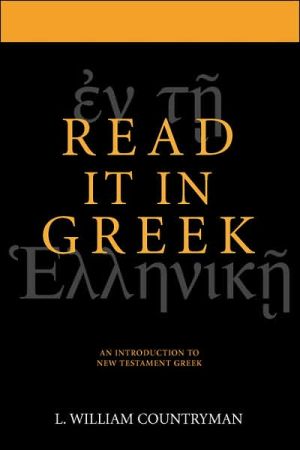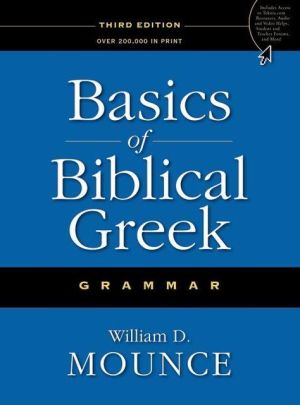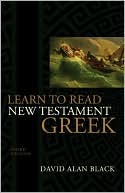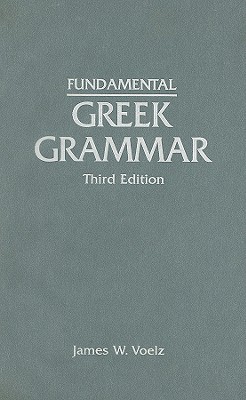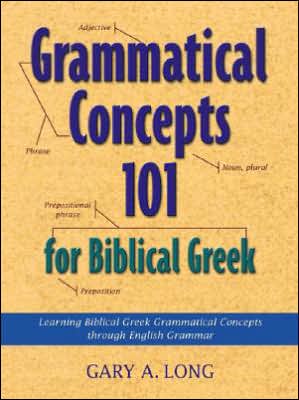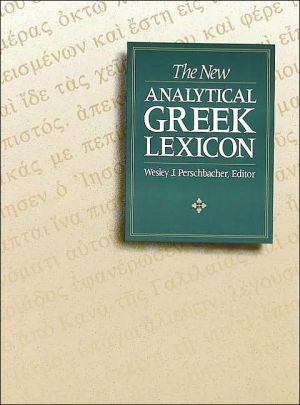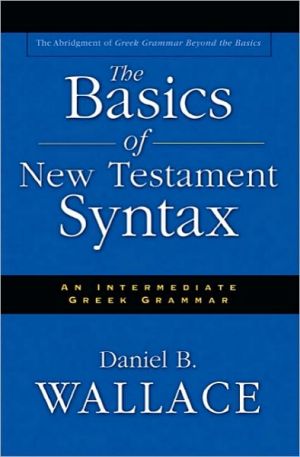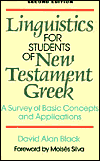Read It in Greek: An Introduction to New Testament Greek
This book focuses on reading the Greek text yet teaches enough syntax to enable students to effectively to deal with texts throughout the New Testament. The grammatical explanations are exceptionally clear and understandable, are based where possible on English usage, and are always related to what has been encountered in the reading.\ From the Publisher In American seminaries today, there is a very limited amount of time available to most students for language study. And yet, a working...
Search in google:
In American seminaries today, there is a very limited amount of time available to most students for language study. And yet, a working knowledge of the original language of the New Testament is imperative for informed exegesis of the biblical texts. Written with this difficult situation in mind, Read It in Greek offers a concise, one-semester introduction to the Greek language of the New Testament. Taking a unique, inductive approach to the study of Greek, this text focuses on reading the Greek—1 John is read through from beginning to end—yet also teaches enough syntax to enable students to interact with all of the New Testament. The book also integrates into the language course lessons in exegesis of the Greek text, resulting in immediate, usable skills that will allow students to look behind the facade of modern-language translations and to follow discussions in technical commentaries and other scholarly works. Students who go beyond the first semester to further study of the language will find it easy to refine the general concepts taught here. Those who do not will have begun reading the Greek New Testament and will have the resources necessary to continue doing so. Originally published as The New Testament Is in Greek: A Short Course for Exegetes, this volume continues to be one of the best resources available for quickly—yet effectively—introducing students to the reading of New Testament Greek. Deirdre J. Good "Extremely user-friendly, and much more than a grammar, this book will educate and delight would-be preachers, seminarians, lay folk, and others interested in "good Bible study.""
LESSON IBasic Elements The Alphabet Diphthongs Breathings Accents Punctuation and Other Signs LESSON II 1 John 1:1 Grammar "Person" and "Number" of Verbs Basic Sentence Types and What Goes into Them—A Quick and Dirty Review LESSON III 1 John 1:2-3a Grammar A Case of Cases Gender and Parsing The Definite Article Paradigm of the Definite Article LESSON IV 1 John 1:3b-5 Grammar The Relative Pronoun Basic Forms of Nouns: First and Second Declensions LESSON V1 John 1:6-7 Grammar Prepositions Personal Pronouns LESSON VI 1 John 1:8-10 Grammar The Two "Selfs" Agreement LESSON VII 1 John 2:1-3 Vocabulary List Grammar Personal Pronouns for First and Second Persons Singular Forms of the Third Declension LESSON VIII 1 John 2:4-6 Grammar Indirect Discourse Personal Endings of Verbs Synopsis of Verb Endings LESSON IX 1 John 2:7-11 Grammar Verb Tenses Augments Reduplication Table of Consonants Redundancy LESSON X 1 John 2:12-17 Grammar More Indicators of Tense Analyzing Greek Verbs LESSON XI 1 John 2:18-25 Grammar Some Distinctive Adjectives The Subjunctive Exegesis The Textual Apparatus (I) LESSON XII 1 John 2:26-3:3 Grammar Demonstrative Pronouns Imperatives Participles Exegesis The Textual Apparatus (II) LESSON XIII 1 John 3:4-10 Grammar Deponent Verbs "Voice" in Verbs Exegesis Principles of Text Criticism LESSON XIV 1 John 3:11-18 Grammar First and Second Aorists Irregular Verbs Exegesis The Punctuation Apparatus LESSON XV 1 John 3:19-24 Grammar Comparison of Adjectives MI-Verbs Exegesis Cross References LESSON XVI 1 John 4:1-6 Grammar The Verb ei í Contract Verbs Exegesis Using the Lexico LESSON XVII 1 John 4:7-12 Grammar Infinitives Exegesis Some Johannine Vocabulary LESSON XVIII 1 John 4:13-17 Grammar Verbs with Liquid and Nasal Stems Exegesis Word Groups LESSON XIX 1 John 4:18-21 Grammar Review of Verbs: Tenses Exegesis Using a Concordance (I) LESSON XX 1 John 5:1-5 Grammar Review of Verbs: Forms Exegesis Using a Concordance (II) LESSON XXI 1 John 5:6-12 Grammar Tenses in Participles Exegesis The Importance of Context LESSON XXII 1 John 5:13-17 Grammar Participles and Subordinate Clauses Exegesis Basic Books for an Exegetical Library Bibliography LESSON XXIII 1 John 5:18-21 Grammar The Genitive Absolute Exegesis Some Concluding Remarks on Exegesis LESSON XXIV 2 John Grammar A Further Use of the Infinitive LESSON XXV 3 John; John 1:1-18 PARADIGMS I. Substantives A. Nouns of the First Declension B. Nouns of the Second Declension C. Substantives Using First and Second Declension Forms D. Nouns of the Third Declension E. Other Substantives Using Third Declension Forms F. Personal Pronouns G. Comparison of Adjectives II. Verbs A. ei í, be B. Tenses of the O-Verb C. Participles of the O-Verb D. Contract Verbs E. MI-Verbs: Two Examples III. Principal Parts of Irregular Verbs IV. Accentuation: A Simplified Account A. Syllables and Individual Accents B. Accents on Substantives C. Accents on Verbs Abbreviations Glossary and Index
\ Deirdre J. Good"Extremely user-friendly, and much more than a grammar, this book will educate and delight would-be preachers, seminarians, lay folk, and others interested in "good Bible study.""\ \ \ \ \ Reformed Theological ReviewWell-written from an educational point of view. The lessons build well on each other.\ \ \ Religious Studies ReviewCountryman ably succeeds in his goal of providing for novice exegetes a one-semester introduction to the Hellenistic Greek of the New Testament.\ \
